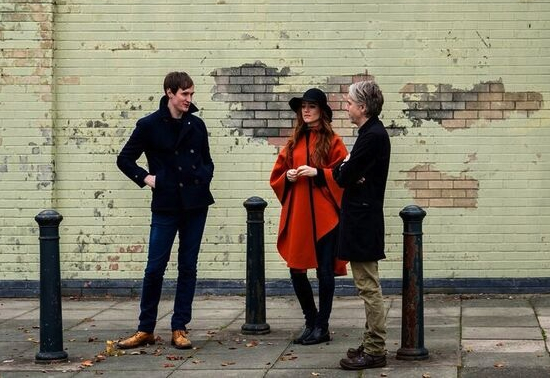Band portraits courtesy of Stephen McCoy, ambient shots by John Freeman
It’s a Monday morning and I’m acting as a taxi-driver for the day. I’ve just picked up at a train station in Wigan. In the car are three passengers and a small dachshund. We are heading for the Lancashire town of Skelmersdale. I’ve just been informed that when we arrive in Skem (as it’s known locally), the dog will have a video camera strapped to its back in order to make a short film. My Monday has just gotten a tad surreal.
The three passengers are The Magnetic North – Simon Tong (once of The Verve – we pass ex-bandmate Richard Ashcroft’s old flat en route), Erland Cooper (minus his Carnival), and multi-instrumentalist and solo-artist Hannah Peel. Their first album, 2012’s Orkney: Symphony Of The Magnetic North, was inspired by Cooper’s childhood home and we are heading to Skelmersdale because the idea for the follow-up record (Prospect Of Skelmersdale) was sparked by the town Simon moved to when he was 11 years old.
It may seem like an unlikely source of inspiration for an album. Designated a ‘new town’ in 1961, Skem was reforged as a series of Brutalist-styled estates, linked by a web of walkways and underpasses. The town has no traffic lights, used to lay claim to the “largest roundabout in Europe” and by the 1970s, it would not have won any pretty city awards.
However, even set against a backdrop of spiralling unemployment, Skem was far from a dystopian cliché. In the early 1980s, the town became the UK centre of the Transcendental Meditation movement. Scores of families moved to Skem to practice the TM ways of the Maharishi. Simon Tong’s family were amongst the new arrivals.
We arrive in town and assume our video-making roles. Simon acts as a navigator – which is critical as the walkways, bridges, underpasses and copycat housing estates are completely disorientating to the first-time visitor. Hannah is the video director, on account of her doing the lion’s share of the dog-walking, while Erland is the fizzing ball of vitality that powers the day along.
Luckily, the dog has an eye for cinematic balance. While we do encounter scenes of crushing urban decay (one boarded-up school looks exactly like the sort of place where people are murdered in gritty TV police dramas), Skem is exceedingly green with streams meandering their way through the wintery woods.
And, perhaps unsurprisingly given the talent on show, Prospect Of Skelmersdale is a joy. Using place names as a catalyst (the ‘Pennylands’ estate, ‘Sandy Lane’ and ‘The Silver Birch’ pub all feature as song titles) and doffing cultural caps to TV soundtracks of the 70s and the earthy grit of the film Kes, the album is warm and reverential. Cooper and Peel’s glorious vocals swoop and interlock amid woodwind, vintage synths and iPhone-recorded samples, bathing Prospect Of Skelmersdale in hope and TM-flecked positivity.
After a top-notch fish and chips pub lunch, we visit the Golden Dome – the TM centre that houses dozens of mattresses for mass meditation sessions – and I quietly swoon as Hannah and Erland briefly sing together to test the Dome’s acoustics. We pass the town’s sub-aqua club and a vibrant library-cum-arts centre, before calling in on a local gig venue crackling with youthful energy. I begin to like the place. It would appear that on Prospect Of Skelmersdale, The Magnetic North have expertly tapped into the latent soul of Skem.
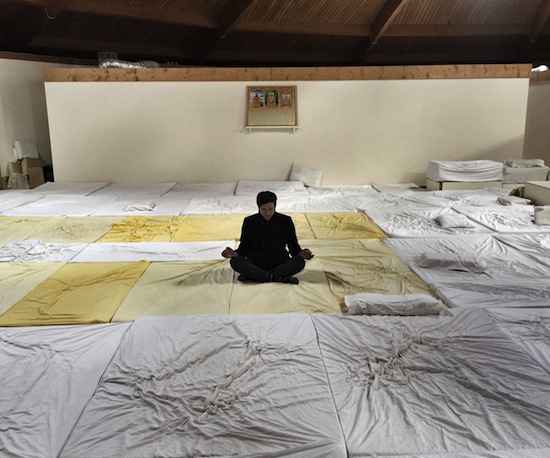
Simon, when and why did your family move to Skelmersdale?
Simon Tong: We moved in 1984. My dad was a TM follower. At the time, in the early 80s, the Maharishi – who I don’t think has ever been to Skem – decided that he wanted to set up ideal villages for TM followers in each country in the world. They would meditate twice a day and the good vibes would infiltrate the surroundings.
What were your first impressions of Skelmersdale?
ST: Skem just seemed a strange place. It was hard, as I had to leave a load of friends behind in Bolton. At first, I was a bit scared that the local population would come marauding through the streets with pitchforks and burn our houses down.
Was there any animosity towards the TM followers?
ST: No. I thought there would be, but everyone was very good-natured. You know what Scousers are like – they found the TM thing funny and amusing. They would take the piss, but there was no animosity.
Back then, how did you feel about the TM movement?
ST: I wanted to distance myself from it. I was a little embarrassed about the whole thing. At school, people would ask if I was one of the TM lot and I would deny everything. However, I did start to meditate when I was 16. I remember being quite a miserable teenager and after meditating for about a week, I began to feel more happy and contented. I did it twice a day for a couple of years and it was a nice foundation.
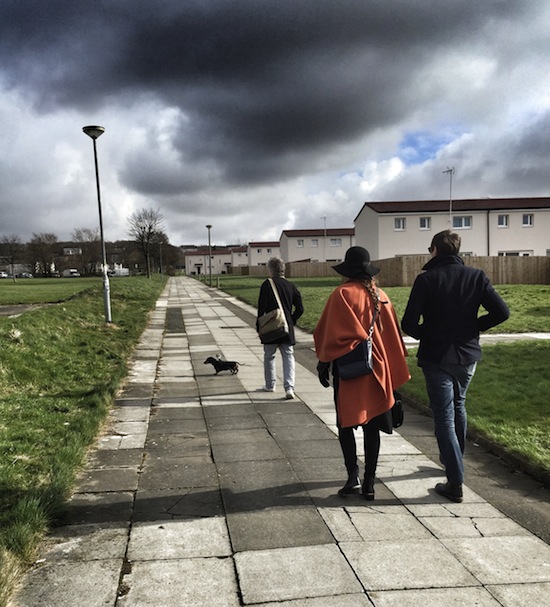
The first album was about Erland’s childhood home of Orkney – which I can see would be a rich source of inspiration. What were your thought processes in deciding to centre this album on Skelmersdale?
Erland Cooper: When you write a record about the Orkney Islands, it has everything from a creative person’s point of view. It had the lot – not just in making a record, but the trips to Orkney, the folklore, the landscape, the weather, the people – which made it a fun, collaborative project. So, a follow-up felt like a natural thing to do when something was that fun, interesting and exciting. It also felt natural to ask the question, “If I am from Orkney, where are you from?” Every time Simon would mention Skem, we would laugh and the conversation would move off very quickly. Nevertheless, we would circle back and little snippets about Skem became to come out – not just the TM stuff, which is a side aspect and interesting but not the root of the album.
What is the root of this album?
EC: The root of the album, for me, is about childhood memories, and the line that joins the dots between both albums is childhood memory and geography. My childhood memories are based in Orkney and Simon’s are based here. For me, it was really exciting creatively, to start to think about that time [in someone’s life]. There is a song on the album called ‘A Death In The Woods’, which is the founding stone of the record. It means the most to me – it sounds like I am listening to a 15-year-old Simon Tong meeting his mates at a shitty bus stop, with dog crap on the pavement, and they are off to find an adventure. That was it for me. It wasn’t really about the place – it was about childhood memories.
Hannah, what were your initial impressions of Skelmersdale during your first visit?
Hannah Peel: When we came here, Erland and I had a great time. Simon had given us a list of places and we visited them, using Simon’s hilarious guided tour notes. We were full of expectations of Simon’s childhood – in that it would be crap – but we had a brilliant time driving around the roundabouts, walking through the Concourse centre and meeting characters in the library. I love Brutalism architecture and it was actually nice being surrounded by concrete, but we were really surprised by how much greenery there was – there are so many trees here. So, we really enjoyed it, and we went back with a little montage video and a track for Simon. However, that was it for about two years. We didn’t want to go any further.
Why not?
EC: For the same reasons I had about the Orkney idea. I wasn’t sure – it was my home and an album could go drastically wrong. People have their own assumptions about what they think places are like. Moreover, you have to open yourself up a wee bit. I imagined Simon felt the same way. Also, Skem is not fucking Orkney, is it? That was the challenge of it.
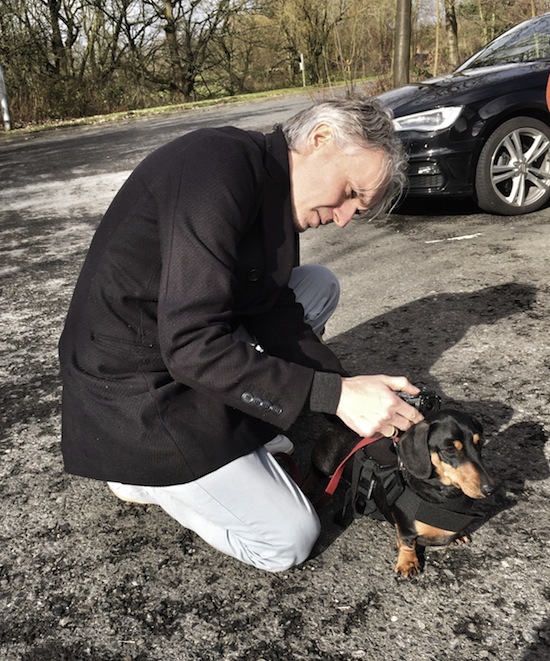
How did you approach the challenge? How did you steer away from making something that sounded patronising or condescending about Skem? It would have been easy to make an album of ‘slum porn’.
ST: That was the initial problem. We didn’t want to take the piss out of this town, or make anything that was tongue in cheek. We wanted to make something positive.
EC: Skelmersdale is a Nordic Viking name, which is strong and powerful. When someone comes up for a name to a place, they don’t come up with ‘Shithole’; they come up with something that is optimistic. If you look at the names on this record – ‘Pennylands’ or ‘Little Jerusalem’ – and when you see them on the road signs, they actually sound quite exotic and optimistic, and a little bit utopian.
ST: There used to be a horrible pub in one of the estates called ‘The Silver Birch’. Hannah thought it sounded quite nice, like a chapter out of a George Eliot novel. The place names give you an image that are nothing like real life. So, it becomes about finding beauty in something that is not necessarily beautiful. It’s about trying to give the record hope. There are ancient place names that have been turned into council estates, and without wanting to sound too wanky about it, there is memory in the landscape. It is under the concrete and it feels like it is trying to get out. They planted many trees around the estates and over the last 40 years, and it almost feel like the countryside is encroaching into the town.
I get that – walking around today, even if the architecture is dated and a little run-down, there is a lot of positive energy in the town.
ST: That’s right. The town was deemed to have failed in the 70s, as all the industry that had moved here had gone, when the government grants ran out. The town was really on its arse, with bad unemployment. The TM people came in because it was cheap, it was somewhere they could use to practice meditation and that might affect the area and make it a nicer place. Some would say that didn’t work, but perhaps it did to an extent. Even if it was nothing to do with the meditation, but more to do with people moving here with positive intent. That, in itself, will affect a place. So, we were trying to tell these childhood memories and stories in songs, but at the same time trying to give it a positive spin, rather than reflecting on the ugliness of the town or the lack of things to do back then.
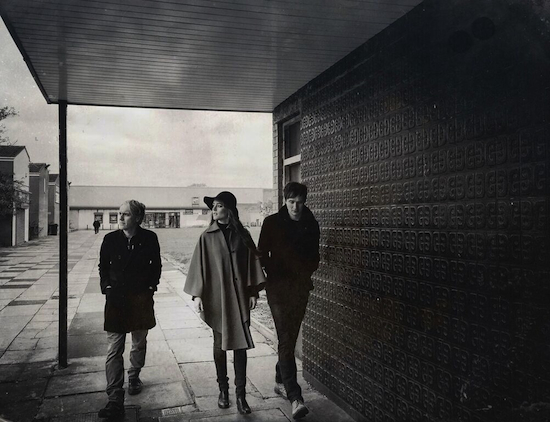
Musically, the new album is a departure from the Orkney record. How easy was it to settle on a ‘Skelmersdale sound’?
HP: I found it really easy. We had created a certain sound as The Magnetic North from the Orkney record. For this album, we had a list of instruments and sounds we would use and we vowed not to go past that list. That really helped focus us in on what the record would sound like. With the town being built in the 60s and 70s, we wanted to relate to TV soundtracks of the time and to the film Kes – that ‘70s sound’ was a real hook for us. So, it felt natural to have flutes, clarinets and other woodwind as they were used a lot at that time. That gave the songs a hopeful feel, which doesn’t make it come across as a grim record. It’s hopeful and bright-eyed.
ST: When I told people we were going to make a record about Skelmersdale, they assumed it would be industrial and grimy. We felt we had to go back and find the inner beauty.
EC: Isn’t it wonderful to try to find a little beauty in somewhere you might not expect it? Generally. Isn’t that enough, to try?
The artwork for the album contains some wonderful photographs of Skelmersdale from the 80s. How did you find the pictures?
ST: It was completely by accident. I was trying to find a local photographer to take some shots of us in Skem, but was having no luck. I then found the name of a Liverpool photographer who had come here in the 80s. He was on a residency for three months and had taken photographs of people around the town. He had a whole archive of stuff from 1984, which was the year I moved to Skem. It was the most amazing coincidence.
Have you had any initial reactions from the Skelmersdale residents?
HP: Many people have seen the photos and have connected with them from their childhood. They’ve told us that the used to play in the playground or remember a certain walkway. Even before the album has been released, a number of the photos are evoking childhood memories. Many people have got in touch from other places. Around that time, about 30 new towns were created in England and many people have contacted us to tell us that they grew up on similar-looking council estates.
Is it important to you that the record is well-received by people living here?
ST: Yes. I really hope the residents of Skem take to the album, but I am prepared for them to think it is a pile of pretentious shit.
EC: But, that is what we thought about Orkney, and we went up there, played in the cathedral in front of 600 people and got a lot of positive feedback.
HP: Even if there were a couple of old ladies with fingers in their ears throughout the show.
So, Hannah, the obvious next step is to explore your childhood town on the next album. How will you approach that?
HP: You think it would the obvious thing. Now it is my turn to say that I don’t think anyone would be at all interested in where I grew up. I have no idea what I would ever write about. As a solo artist I already write about things that are personal – so it would be more about getting the perspective of the other two if they were to visit where I was from [a list that includes Barnsley, and Craigavon in Northern Ireland] and then for them to help me think about it. The key to this project is the other people’s interpretation of a place.
Prospect Of Skelmersdale is out on March 18 via Full Time Hobby

